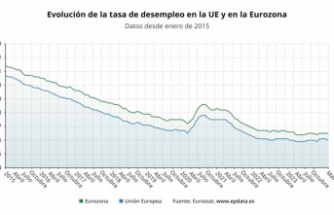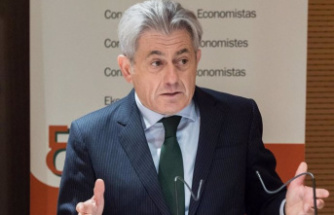Confirms the 'pay-out' of 80% and will continue to be the "most attractive" company in the sector in its dividend policy
The airport manager Aena estimates that its consolidated gross operating result (Ebitda), excluding impairments, will grow by more than 20% until 2026 compared to 2023, as reported by the company, which presents this Thursday the update of its strategic plan.
In a presentation to the National Securities Market Commission (CNMV), Aena has assured that it will maintain the Ebitda margin at around 59%, referring to the group's parent company, while confirming the 'pay-out' of 80%. %, stating that "it will continue to be the most attractive company in the sector in its dividend policy."
For its part, commercial income could grow by 48% in 2026 compared to 2019 (in the presentation of the plan in November 2022 it was estimated that it would grow by 23%) and commercial income per passenger by 32% (compared to to 12%).
Aena has brought forward the goal of 300 million passengers to 2025, one year ahead of what was planned in the strategic plan presented in 2022, while predicting that in 2026 it will reach an approximate number of 310 million passengers.
MORE THAN ONE MILLION PASSENGERS PER DAY WORLDWIDE BY 2026
The airport manager has explained that it expects to close 2024 with around 294 million passengers, and has presented "good prospects" for this year's summer season, with a schedule around 7% higher than that of 2023.
In this sense, the company has explained that these figures will be known in "more detail" in the coming days, although it has stressed that "it must be taken into account that the days before the start of the summer season there are usually some adjustments to the low".
In addition, Aena will manage more than one million passengers a day in 2026 in all the airports it operates in the world, highlighting that this "strong" rebound in traffic, more "accented" in tourist airports, "will make more investments necessary in the infrastructure, with the aim of synchronizing capacity with expected demand and, also, of adapting airports to the new security requirements and maintaining the quality of service".
Therefore, in the Airport Regulation Document (DORA) III, which will run from 2027 to 2031, Aena will propose investments that will at least double those made in recent years. At this time, Aena is beginning the analysis of the needs of all Spanish airports to design the investment proposal that will be presented to airlines in 2026.
"SUCCESSFULLY" COMPLETE THE TENDER
Aena has detailed in a press release that it has "successfully" completed the tenders for the main lines of activity, referring to the duty-free stores, awarded in their entirety; restaurants, with 80 awards during 2022 and 2023, or stores, with 200 awards.
The company has explained that it is developing "new concepts" to attract new commercial operators to airports, which is reflected in a "significant" increase in participation in the latest competitions. As a result of these tenders, the Minimum Guaranteed Rents (RMGAs) increased by 20% in 2023 compared to 2019 and are expected to continue increasing by up to 46% in 2026.
With regard to real estate activity, income in 2023 exceeded that of 2019 by more than 34%, with the main projects in this area focusing on the Adolfo Suárez Madrid-Barajas Airport (in 2026, 25% of the area associated with the airport city of Madrid) and at the Josep Tarradellas Barcelona-El Prat Airport (whose airport city is linked to the airport 'hub' development project).
HIRE SECURITY UNTIL 2028
The president and CEO of Aena, Maurici Lucena, has assured that efficiency "will continue to be one of the hallmarks of the company, given that the manager has already contracted the "most relevant" expense items for the coming years."
In this sense, Aena has highlighted that security has been contracted until 2028 through a "competitive" dialogue process with operators in the sector; cleaning, until 2026, at the Adolfo Suárez Madrid-Barajas and Josep Tarradellas Barcelona-El Prat airports, and the assistance service for people with reduced mobility (PMR) has been contracted until 2026 at 22 airports in the network.
Likewise, the assignment of the new handling licenses, as Aena has highlighted, "will improve the sustainability and competitiveness of the manager's airports in Spain in the next seven years, with a significant increase in electric and sustainable fleets." of the new agents".
'ZERO EMISSIONS' AIRPORTS TEN YEARS EARLIER THAN EXPECTED
Another goal that is advanced in this update of the strategic plan is the achievement of 'Net Zero', which goes from 2040 to 2030.
"Aena's commitment to sustainability is non-negotiable and is a transversal factor of our strategic framework, as proven by the fact that every year we report our climate action plan at the shareholders' meeting," Lucena declared.
In 2026, a total of 19 airports in the network in Spain will have ACA (Airport Carbon Accreditation) level 4 certifications and, in 2030, they will be raised to level 5.
MORE CAPACITY IN LONDON-LUTON AND CONSOLIDATION IN BRAZIL
Aena has explained that it maintains its aspiration that international activity represents 15% of Ebitda in 2026, with the priority objective of consolidating current international assets and fulfilling its business plans.
At London-Luton Airport, government authorization has been obtained to increase capacity from 18 to 19 million passengers annually and, in Brazil, mandatory investments in the six airports in the northeast have been completed.
Throughout the last quarter of 2023, Aena took control of the so-called Block of Eleven Airports in Brazil (BOAB), including Congonhas, in Sao Paulo, the second with the highest passenger traffic in Brazil.
In this context, Aena has assured that the transition has been made "without any operational impact" and that in total it already manages 20% of Brazil's air traffic.













